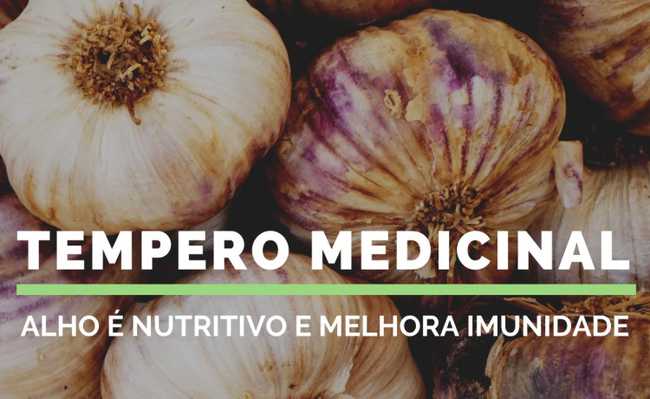Ten Benefits of Garlic for Health
Garlic is nutritious, improves immunity and bone health, among other benefits

Garlic is an edible plant belonging to the genus Allium, widely used as a spice and for medicinal purposes. It grows in many parts of the world and is a popular culinary ingredient due to its strong smell and delicious taste.
However, throughout ancient history, the main use of garlic was due to its medicinal properties. Its use has been well documented by all major civilizations, including the Egyptians, Babylonians, Greeks, Romans and Chinese.
- Leeks: Nine Amazing Benefits
Most of the health benefits of garlic are due to the presence of sulfur compounds formed when a clove of garlic is minced, crushed, or chewed. However, these compounds are also responsible for bad breath.
- How to get rid of bad breath naturally
Health Benefits of Garlic
1. Garlic is highly nutritious and low in calories.
A 28 gram serving of garlic contains:- Manganese: 23% of Recommended Daily Intake (RDI)
- Vitamin B6: 17% of the RDI
- Vitamin C: 15% of the RDI
- Selenium: 6% of the IDR
- Fiber: 0.6 gram
- Significant amounts of calcium, copper, potassium, phosphorus, iron and vitamin B1
This serving of garlic contains just 42 calories, with 1.8 grams of protein and 9 grams of carbohydrates.
2. Improves immunity
Garlic capsule supplementation is known to improve immune system function. A 12-week study found that a daily supplement with garlic capsules reduced the number of colds by 63 percent compared to placebo.
The mean duration of cold symptoms was also reduced by 70%, from five days in the placebo to just one and a half days in the garlic capsule group.
Another study found that a high dose of garlic extract (2.56 grams per day) can reduce the number of days of cold or flu by 61%.
If you often have colds, adding raw garlic to your diet can be incredibly helpful.
3. Lowers blood pressure
Cardiovascular diseases such as heart attacks and strokes are some of the world's most killer diseases. Hypertension is one of the most significant triggering factors for these diseases.
Human studies have found that supplementation with garlic capsules has a significant impact on lowering blood pressure in people with high blood pressure (see studies here: 1, 2, 3).
In one study, garlic extract in doses of 600 to 1,500 mg was as effective as the drug Atenolol in lowering blood pressure over a 24-week period.
Supplement doses must be reasonably high to have these desired effects. The amount of allicin (garlic compound) needed is equivalent to about four cloves of garlic a day.4. Improves cholesterol levels
Garlic can lower total and LDL cholesterol.- Does altered cholesterol have symptoms? Know what it is and how to prevent it
For those with high cholesterol, supplementation with garlic capsules can reduce total cholesterol and/or LDL by about 10-15% (see studies here: 4, 5, 6).
Garlic lowers LDL cholesterol levels, which are known as "bad cholesterol". HDL cholesterol, the "good cholesterol", does not show a reduction in its levels after consumption of garlic capsules (check the studies here: 7, 8, 9, 10, 11).
5. Prevents dementia and Alzheimer's disease

Image: Garlic, by Gaelle Marcel on Unsplash
Oxidative damage from free radicals contributes to the aging process. Garlic contains antioxidants that support the body's protective mechanisms against oxidative damage.
High doses of garlic capsule supplementation have been shown to increase antioxidant enzymes in humans (see studies here: 12, 13) as well as significantly reduce oxidative stress in people with high blood pressure (1).
The combined cholesterol and blood pressure lowering effects, as well as antioxidant properties, can help prevent common brain diseases such as Alzheimer's disease and dementia (12, 13).
6. Increases longevity
Effects on longevity are virtually impossible to prove in humans. However, the beneficial effects of garlic on important risk factors such as blood pressure are factors that potentially contribute to longevity.
The fight against infectious diseases provided by the ingestion of garlic is also an important factor that contributes to longevity, as they are common causes of death, especially in the elderly or people with weakened immune systems.
7. Improves athletic performance
Garlic was traditionally used in ancient cultures to reduce fatigue and increase work capacity and was used by Olympic athletes in ancient Greece.
Studies with rodents have shown that garlic helps with exercise performance. However, there are few studies done with humans.
Individuals with heart disease who took garlic oil for six weeks had a 12% reduction in peak heart rate and improved exercise capacity.
However, a study of nine competitive cyclists found no benefits of garlic for physical performance.
- Garlic oil: what is it for and benefits
Other studies suggest that exercise-induced fatigue can be reduced with garlic.
8. Contributes to heavy metal detox
In high doses, the sulfur compounds in garlic protect against organ damage caused by heavy metal toxicity.
A four-week study of employees at a car battery factory (excessively exposed to lead) showed that garlic lowered blood lead levels by 19%. The study also showed that garlic reduced many clinical signs of toxicity, including headaches and blood pressure.
9. Improves bone health
No human tests have measured the effects of garlic on bone loss. However, rodent studies have shown that it can minimize bone loss by increasing estrogen in women (see studies here: 14, 15, 16, 17).
A study of menopausal women showed that a daily dose of dry garlic extract (equivalent to two grams of raw garlic) significantly decreased a marker of estrogen deficiency. This suggests that this garlic may have beneficial effects on bone health in women.
Garlic and onions have also been shown to have beneficial effects on osteoarthritis.
10. It is easy to include in the diet
The last benefit of garlic is not a health benefit, but it is still important. The fact is, it's very easy (and delicious) to include garlic in your diet.
It complements most savory dishes, particularly soups and sauces. The strong flavor of garlic can also add flavor to dull recipes.
The minimum effective dose for therapeutic effects is one raw tooth taken with meals, two or three times a day.
However, keep in mind that there are some disadvantages to garlic, such as bad breath. There are also some people who are allergic to it.
If you have a bleeding disorder or are taking blood thinning medications, talk to your doctor before increasing your garlic intake.
Allicin (the active compound in garlic) only forms when raw garlic is crushed. If you cook it before you crush it, it won't have the same health benefits.
Therefore, the best way to consume garlic is raw.










